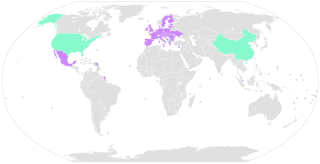 W
WBrussels II Regulation (EC) No 1347/2000, which came into force on 1 March 2001, sets out a system for the allocation of jurisdiction and the reciprocal enforcement of judgments between European Union Member States and was modelled on the 1968 Brussels Convention on Jurisdiction and the Enforcement of Judgments in Civil and Commercial Matters. It was intended to regulate domains that were excluded from the Brussels Convention and Brussels I. The Brussels II Regulation deals with conflict of law issues in family law between member states; in particular those related to divorce and child custody. The Regulation seeks to facilitate free movement of divorce and related judgments between Member States.
 W
WThe Brussels Regime is a set of rules regulating which courts have jurisdiction in legal disputes of a civil or commercial nature between individuals resident in different member states of the European Union (EU) and the European Free Trade Association (EFTA). It has detailed rules assigning jurisdiction for the dispute to be heard and governs the recognition and enforcement of foreign judgments.
 W
WCapacity or more fully mental capacity covers day-to-day decisions, including: what to wear and what to buy, as well as, life-changing decisions, such as: whether to move into a care home or whether to have major surgery.
 W
WForced heirship is a form of testate partible inheritance which mandates how the deceased's estate is to be disposed and which tends to guarantee an inheritance for family of the deceased.
 W
WThe Convention on the Law Applicable to Contractual Obligations 1980, or the "Rome Convention", is a measure in private international law or conflict of laws which creates a common choice of law system in contracts within the European Union. The convention determines which law should be used, but does not harmonise the substance. It was signed in Rome, Italy on 19 June 1980 and entered into force in 1991.
 W
WDicey, Morris & Collins on the Conflict of Laws is the leading English law textbook on the conflict of laws (ISBN 978-0-414-02453-3). It has been described as the "gold standard" in terms of academic writing on the subject, and the "foremost authority on private international law".
 W
WA forum selection clause in a contract with a conflict of laws element allows the parties to agree that any disputes relating to that contract will be resolved in a specific forum. They usually operate in conjunction with a choice of law clause which determines the proper law of the relevant contract.
 W
WThe Hague choice of court convention, formally the Convention of 30 June 2005 on Choice of Court Agreements, is an international treaty concluded within the Hague Conference on Private International Law. It was concluded in 2005, and entered into force on 1 October 2015. The European Union, Denmark, Mexico, Singapore and the United Kingdom are parties to the convention. China, Israel, North Macedonia, Ukraine and the United States signed the convention, but did not ratify.
 W
WThe Hague Conference on Private International Law (HCCH) is an intergovernmental organisation in the area of private international law, that administers several international conventions, protocols and soft law instruments.
 W
WThe Hague Convention on the Law Applicable to Trusts and on their Recognition, or Hague Trust Convention is a multilateral treaty developed by the Hague Conference on Private International Law on the Law Applicable to Trusts. It concluded on 1 July 1985, entered into force 1 January 1992, and is as of September 2017 ratified by 14 countries. The Convention uses a harmonised definition of a trust, which is the subject of the convention, and sets Conflict rules for resolving problems in the choice of the applicable law. The key provisions of the Convention are:each party recognises the existence and validity of trusts. However, the Convention only relates to trusts with a written trust instrument. It would not apply trusts which arise without a written trust instrument. the Convention sets out the characteristics of trusts under the convention the Convention sets out clear rules for determining the governing law of trusts with a cross border element.
 W
WThe internal affairs doctrine is a choice of law rule in corporations law. Simply stated, it provides that the "internal affairs" of a corporation will be governed by the corporate statutes and case law of the state in which the corporation is incorporated, sometimes referred to as the lex incorporationis.
 W
WThe Brussels I Regulation contains a jurisdictional regime: the rules which courts of European Union Member States use to determine if they have jurisdiction in cases with links to more than one country in the European Union. The basic principle is that the court in the member state of the party that gets sued has jurisdiction, while other grounds exist, which are diverse in content and scope, and are often classified in descending order of exclusivity and specificity. The original Brussels Regulation (44/2001) is, with regard to jurisdiction rules, very similar to the 2007 Lugano Convention, containing the same provisions with the same numbering. Numbering and certain substantial issues are different in the 2012 recast version of the Regulation, which has applied since 1 January 2015 (1215/2012).
 W
WIn international law, legalization is the process of authenticating or certifying a legal document so a foreign country's legal system will recognize it as with full legal effect.
 W
WThe Maintenance Regulation (EC) No 4/2009, formally the Council Regulation (EC) on jurisdiction, applicable law, recognition and enforcement of decisions and cooperation in matters relating to maintenance obligations, is a European Union Regulation on conflict of law issues regarding maintenance obligations. The regulation governs which courts have jurisdiction and which law it should apply. It further governs the recognition and enforcement of decisions. The regulation amends the Brussels Regulation, which covers jurisdiction in legal disputes of a civil or commercial nature between individuals more broadly.
 W
WThe Moçambique rule, or Mozambique rule, is a common law rule in private international law. The rule renders actions relating to title in foreign land, the right to possession of foreign land, and trespass to foreign land non-justiciable in common law jurisdictions. It was established in 1893 by the House of Lords decision in British South Africa Co v. Companhia de Moçambique [1893] AC 602.
 W
WThe Papal Jurisdiction Act 1560 (c.2) is an Act of the parliament of Scotland which is still in force. It declares that the Pope has no jurisdiction in Scotland and prohibits any person from seeking any title or right to be exercised in Scotland granted under the authority of the Pope, on pain of proscription, banishment and disqualification from holding any public office or honour.
 W
WThe Rome I Regulation of the European Parliament and of the Council of 17 June 2008 on the law applicable to contractual obligations) is a regulation which governs the choice of law in the European Union. It is based upon and replaces the Convention on the Law Applicable to Contractual Obligations 1980. The Rome I Regulation can be distinguished from the Brussels Regime which determines which court can hear a given dispute, as opposed to which law it should apply. The regulation applies to all EU member states except Denmark, which has an opt-out from implementing regulations under the area of freedom, security and justice. The Danish government planned to join the regulation if a referendum on 3 December 2015 approved converting its opt-out into an opt-in, but the proposal was rejected. While the United Kingdom originally opted-out of the regulation they subsequently decided to opt-in.
 W
WThe temporal power of the Holy See designates the political and secular influence of the Holy See, the leading of a State by the pope of the Catholic Church, as distinguished from its spiritual and pastoral activity.
 W
WUNIDROIT is an intergovernmental organization whose objective is to harmonize international private law across countries through uniform rules, international conventions, and the production of model laws, sets of principles, guides and guidelines. Established in 1926 as part of the League of Nations, it was reestablished in 1940 following the League's dissolution through a multilateral agreement, the UNIDROIT Statute. As at 2019 UNIDROIT has 63 member states.